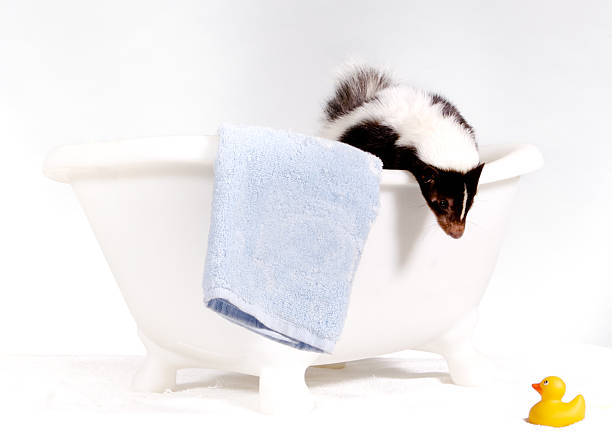Skunks are easily recognizable thanks to the distinctive white lines over their jet black fur and of course, their stinky smell. The extremely unpleasant scent of skunk spray which is emitted from their anal glands can be overpowering and long-lasting, reminiscent of rotten eggs. It is a mix of sulfur-based organic compounds and thioacetates.
This is probably why no one wants to see a skunk in their home. Skunks can be playful, friendly and cuddly when raised in captivity but since most are not domesticated, you can expect them to be anything but. They are especially a danger to those with pets, since these wild animals may carry rabies.
Understanding Skunk Behavior
In North America, the most widespread skunk species are the striped skunk which you may see in urban parklands and suburban areas. These warm-blooded mammals are about the size of a house cat and they eat roots, vegetation, insects and other small animals. They are nocturnal creatures that usually breed around May to June, and with offspring numbering from 2-12.
Female skunks prepare ground dens beneath man-made shelters such as under raised sheds or other animal dens during breeding season. This is why skunks are more likely to be seen in the summer and winter.
Skunks are fearless animals and they are often seen foraging for food in garbage bins, coops, lawns, yards, bird feeders and pet feeding areas.
If you spot a skunk in your property, it’s not recommended to handle them yourself as they may carry and spread rabies. This is especially true if you notice unusual behavior in the animal. It’s best to contact animal control or pest control services like Western to handle the situation.
How to Get Rid of Skunks
The first thing you need to do is to get rid of food sources that the skunk may be attracted to. They are omnivorous animals and will eat worms, grubs, bird seed, dry or wet pet food, eggs, and others. So eliminate or prevent their access to these food sources to discourage them from sticking around.
Next, use light and noise to chase them away. Keep your yards lighted during night-time or install motion sensor lights and electronic noise makers (as long as it won’t disturb your neighbors).
You can also use chemical repellants which often come in granular or liquid form. These products contain dog or fox urine which skunks are not exactly fond of. Spray the product on areas that are frequented by the skunk.
Finally, if allowed in your state, you can consider setting traps. You can buy these in your local hardware and put fresh/canned fish as bait, or even pet food with a strong scent. Wear protective gear and bring any covering like a big piece of cloth to prevent the skunk from spraying its nasty smell on you.
Skunk-Proof Your Home
You can keep skunks away by making sure they don’t find any food source or potential shelter in your property or home. You may want to set up a special kind of fence that they can’t climb into, and be sure to bury your fence up to 8 inches deep so they can’t dig through it as well.
We also recommend that you do the following:
- Securely cover all garbage bins
- Block crawlspaces
- Remove pet food outdoors at night
- Remove junk and trash piles
Skunks do not necessarily attack people and pets but if threatened, they can spray you. To avoid having to deal with this problem, calling a pro may be necessary. They can catch skunks using a trap more effectively. Moreover, skunks that wander around during the day (they are nocturnal creatures) appearing aggressive or erratic may be carrying rabies which makes them even more dangerous.
